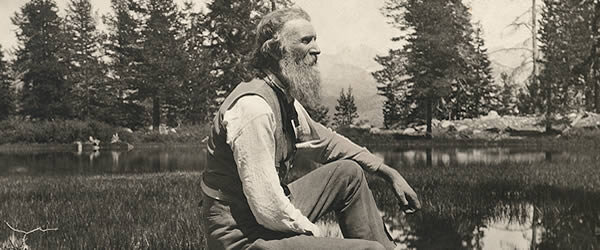A Most Successful Camping Trip
/On this Earth Day, I want to share the tale of two men - one, a conservationist and fierce advocate for the idea of national parks - and the other, a rugged outdoorsman who became President of the United States.
John
John Muir
John Muir (1838-1914) was the son of a Presbyterian minister. He was born in Scotland and came to the United States in 1849 where they settled in Wisconsin. This, of course, was a time of great upheaval in the country. A civil war was brewing and later fought, the industrial revolution was underway and would dominate American life to create land barons and tycoons, and the land was viewed as something to “tame” - and not to preserve.
John could have easily jumped into the manufacturing careers of the time as he was talented and smart. But, he felt the calling to wander - to explore - to sketch what he observed - and to write about it. His writings were noticed by the magazines of the time and published. John considered his transformation as an advocate for preserving the environment as an “unconditional surrender to nature”.
You can read more about John Muir HERE.
Teddy
Teddy Roosevelt
Theodore (Teddy) Roosevelt (1858-1919) was born to a wealthy, connected family in New York. He suffered from various childhood ailments that kept him home, inside for much of the time. He, however, was very interested in nature so, even as a kid, he studied taxidermy so he could preserve and study animal specimens. He would donate his work to museums so others could learn also.
Teddy and John at Yosemite (Glacier Point)
Teddy overcame his childhood sicknesses by being an advocate of what he called “the strenuous life”. He got outside. He learned to hunt, to ride horses, to herd cattle, to fish, and later, even though he was comfortably set as a public official, he led a cavalry regiment - the Rough Riders - into battle during the Spanish-American War. Teddy became Vice President and then President (the youngest ever) when Pres. William McKinley died. He became a wild, popular, different kind of a president - one who was interested in respecting the beauty and diversity of nature.
You can read more about Teddy Roosevelt HERE.
The Camping Trip
In 1903, President Roosevelt took a three-day camping trip with John Muir to the unspoiled Yosemite Valley. John wanted to persuade Teddy to return this area of the nation to federal protection. He did. Not only did President Roosevelt resolve to protect Yosemite—he would go on to sign into existence 5 more national parks, 18 national monuments, 55 national bird sanctuaries, wildlife refuges, and 150 national forests.
“Roosevelt did more for the national park idea than any other president in history. During a cross-country trip in 1903, he spent three nights camping alone in Yosemite with the other great champion of the parks, mountain prophet John Muir, who enlisted Roosevelt into making Yosemite Valley part of a larger national park. Snow fell on them the night they camped here, near Glacier Point. It was, the outdoorsman president recalled, “the grandest day of my life.””







